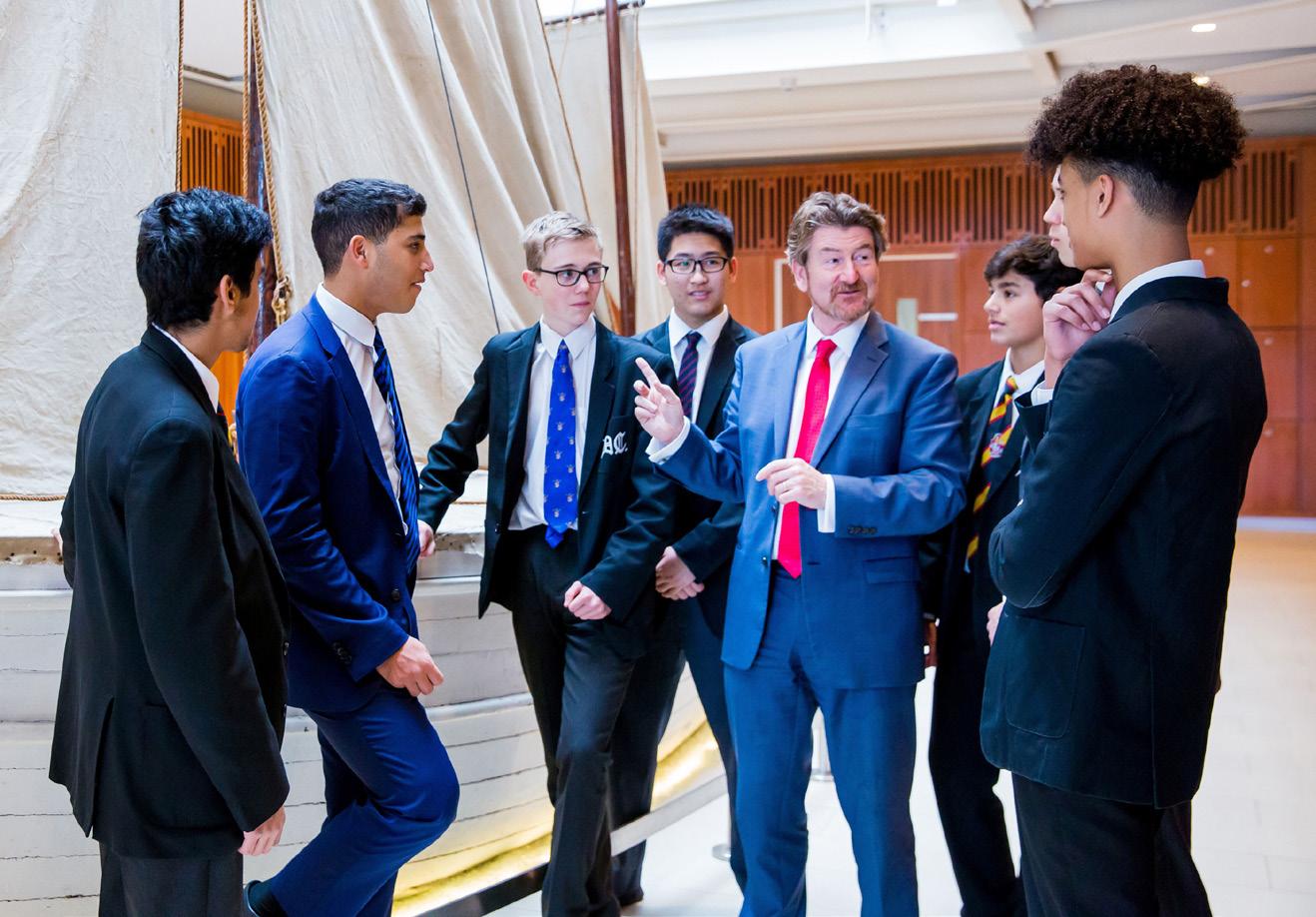
4 minute read
Free Learning
Some eight years ago Dr. Joe Spence coined a term to describe his passion for all sorts of learning beyond the curriculum, “free learning”. Free Learning has come to be seen as integral to a Dulwich education and has been embraced by pupils, teachers and parents. It’s also impacting on learning beyond Dulwich.
Building skills beyond exams
How do we ensure our students cultivate interests that define them away from their public exams and help prepare them for life beyond school? Free Learning does just that by providing learning opportunities that are freely engaged in by students and teachers, driven by individual interests and that are relevant, knowledge-rich and which develop the skills our pupils will need in the future.
What is Free Learning?
It is learning that extends beyond and is free from a syllabus and from examination, and that challenges pupils to think for themselves. It is fed by intellectual curiosity, often supported by the interest and enthusiasm of a teacher or peer-mentor, and it is frequently interdisciplinary in nature; it breaks through the compartmentalisation of learning that subject syllabuses can impose. It also allows the possibility of failure, from which pupils learn important lessons. It is about making connections, challenging what we know, and about learning how to avoid following the herd.
Where is Free Learning experienced?
Within academic lesson time, in its simplest form it might be a teacher embracing the natural interest of the class, and extending knowledge and thought beyond the syllabus. In Chemistry, for example, the teacher may be encouraged through pupil questioning to discuss 2-D proton NMR, rather than the simple high-resolution spectra presented on the syllabus. Too often in our classrooms pupils are told that their questions are interesting but not relevant; sometimes allowing time for those “red herring” questions can reap massive intellectual rewards.
Embedded within the timetable at Dulwich is A Level Plus in Year 12 where pupils can choose from over 25 courses ranging from Astrophysics to 21st century Geopolitics. In Year 13 pupils elect to study one of 28 Liberal Studies courses which include topics such as Film and Feminism and Post-War Modernism, and teaching is shared with local schools, JAGS and Sydenham High GDST. These courses are designed by teachers, led by their interests and expertise, and provide an undergraduate-like depth of knowledge.
Beyond the classroom a vibrant union of over 60 societies provides extensive opportunities; in Poultry Society pupils consider the sustainable production of meat and learn about farming; in LGBT+ Society pupils question prejudice and explore the history of LGBT+ rights.
The STEAM societies, such as Engineering, Art and the Literary Society, host external speakers and prepare students for national and international competitions. Pupils are encouraged to establish their own societies if their interests are not served; recent additions include Dismantling Society and BrewSoc (for Upper School pupils only). These societies offer pupils an opportunity to lead, develop communication skills, to connect with professionals outside school, and to learn from each other. The talks and workshops of annual Symposia raise student

Recently I asked every member of my SMT “What does Free Learning mean to you?”
From all the excellent responses the one that particularly resonated identified that Free Learning is where individual interest and passion is fuelled, links are made beyond the curriculum and a deeper understanding is achieved, not just of the world but of ourselves.
aspirations and give students access to a diverse network of academics and professionals who happily become role models and mentors. Free Learning Weeks give pupils time and space to consider important issues facing our world. Our most recent was the third DC IAM (Dulwich College Identity Awareness Month) which was given the title Here/ Hear. Pupils explored how physical spaces and places contribute to our identity, our sense of self and of belonging. They did this through engaging in sewing workshops; a talk from Sir Nick Partridge (former CEO of the Terrence Higgins Trust); poetry competitions and talks on famous LGBT+ scientists on Alan Turing Day. Dulwich Digital Week saw tech entrepreneurs visit the College and deliver workshops on coding and data manipulation, startups and the use of big data, and Eco Week included a ‘Drowning in Plastic’ dance project and the creation of biodegradable plastics. These weeks also involve lesson hijacks where whole year groups are encouraged to consider a concept - Time, Space, Power - in subject contexts.
A wide range of outings and expeditions supports all this, along with competitions and our weekly virtual lecture series Thinking About…, run out of the College by pupils of the Southwark Schools Learning Partnership, which invites leaders in their fields to tackle the issues - academic, political and vocational - that are exercising them.
Skills for Life
Employers need graduates with problem solving and practical skills; people who can communicate well and demonstrate leadership qualities, as well as make connections, be intellectually curious and have polymathic tendencies. By engaging in culturallyrelevant, knowledge-rich activities, pupils develop independence and resilience, they become creative and learn to lead.
Free learners will contribute greatly to their communities over the next generation. Only free learning pupils will be able to address the challenges in relation to the environment and to race, class, gender and sexuality that their generation faces.
DR. JOE SPENCE, The Master, Dulwich College
www.dulwich.org.uk
TURN TO P56 to read about the Partnership Programme at Benenden
Help with School Fees
Bursaries and Scholarships
Over 35% of boys are supported with financial awards at Dulwich College www.dulwich.org.uk
www.savills.co.uk











